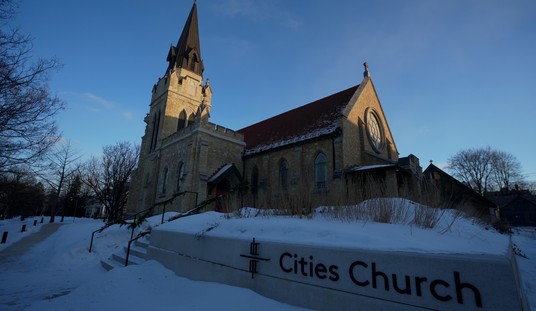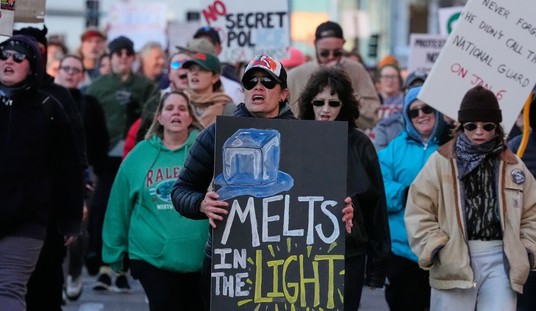A smart argument from Mark Esper, who perhaps has more than one reason to push back against using the Insurrection Act to deal with riots in American cities. Speaking at the Pentagon this morning, the Secretary of Defense called that a “last resort” option, for use only in “the most urgent and dire of situations.” The National Guard under control of governors is the proper alternative for bolstering local law enforcement, Esper says, throwing cold water on Donald Trump’s suggestions this week that he might bypass the “weak” response from state executives to the riots:
Defense Sec. Esper: "I do not support invoking the Insurrection Act."
"The option to use active-duty forces in a law enforcement role should only be used as a matter of last resort and only in the most urgent and dire of situations. We are not in one of those situations now." pic.twitter.com/MFgi35e8hs
— ABC News (@ABC) June 3, 2020
Esper’s undoubtedly correct about the use of the Insurrection Act as a last-gasp option. George H. W. Bush invoked it for the Rodney King riots in 1992, but that came at Gov. Pete Wilson’s express request for federal troops in addition to National Guard and local police. In fact, Wilson wanted Bush to federalize the National Guard troops as well, likely hoping that outside control of those groups would reduce tensions created by the LAPD in the first place. The last time the Insurrection Act got invoked in opposition to a governor was in Arkansas during desegregation, when Dwight Eisenhower federalized the National Guard and sent in Army troops to open up the Little Rock schools. That was to enforce the Constitution and the Supreme Court’s Brown v Board of Education decision, which Faubus illegitimately used the National Guard to oppose. It had a very limited scope, though, and a very specific mission.
Does the authority exist? Yes. Is it wise to invoke it now? No, as Esper says, and for a couple of other reasons, too. For one thing, seizing law-enforcement control of the cities effectively puts Trump in charge of them — every aspect of them, right down to trash collection and traffic lights. Just as it’s impossible to run a national economy via central command, that kind of control of even one city from Washington DC would be impossible, too. (The feds don’t even do that very well with Washington DC itself, over which they have explicit authority and jurisdiction.) If Trump tries it with more than one city, those problems get magnified exponentially. It sets up all sorts of vectors for failure that will shortly combine into a Hurricane Katrina-like narrative of incompetence — and local leaders who get sidelined will have every political incentive to make sure of it, as will local and national media.
Esper might have other motives for making this declaration, though. He made it very clear last night in an interview with NBC News that he didn’t appreciate getting blindsided with Trump’s Lafayette Park photo-op stunt the other night:
Defense Secretary Mark Esper says he was given no notice before President Donald Trump led him and other senior administration officials to St. John’s Episcopal Church for a widely criticized photo opportunity.
“I thought I was going to do two things: to see some damage and to talk to the troops,” Esper said Tuesday night in an exclusive interview with NBC News.
Esper said he believed they were going to observe the vandalized bathroom in Lafayette Square, which is near the church.
“I didn’t know where I was going,” Esper said. “I wanted to see how much damage actually happened.”
Esper was still sore about that this morning, too:
https://twitter.com/AaronBlake/status/1268183868546392064
Esper also got ripped for participating in the event by former Joint Chiefs chair Admiral Mike Mullen and Defense Science Board member James Miller, who resigned his position in an open letter last night published by the Washington Post. He’s not just standing by with his mouth shut despite working for a president whose reputation for retaliation is hardly a secret. Esper’s not resigning, but he made it pretty clear that he won’t turn into a yes man to keep his job, either.
In any event, Esper’s correct, but one has to suspect that Trump already knows this. The threat to invoke the Insurrection Act is likely a high-stakes bluff, or at least a way to pressure governors into acting more assertively to restore order. It had an effect on Andrew Cuomo, who finally raised the possibility of calling up the National Guard after a night of rioting and publicly blasted Bill de Blasio and the NYPD for allowing rioting and looting to occur unchecked in the Big Apple. If that threat results in better policing, so much the better.
Update: Apparently Esper’s remarks went over at the White House like the proverbial flatus in church, according to CNN’s sources. They claim also to have been blindsided:
Trump and other top officials, including national security adviser Robert O’Brien, are “not happy” with Esper after his Wednesday remarks, three people familiar with the White House’s thinking said.
In the press conference, Esper also distanced himself from a maligned photo-op outside St. John’s Church.
One White House official said aides there did not get a heads up about the content of Esper’s remarks, including most notably Esper’s decision to publicly break with the President on the use of the military to address unrest in US cities.
The blindsiding went both ways, in other words.








Join the conversation as a VIP Member